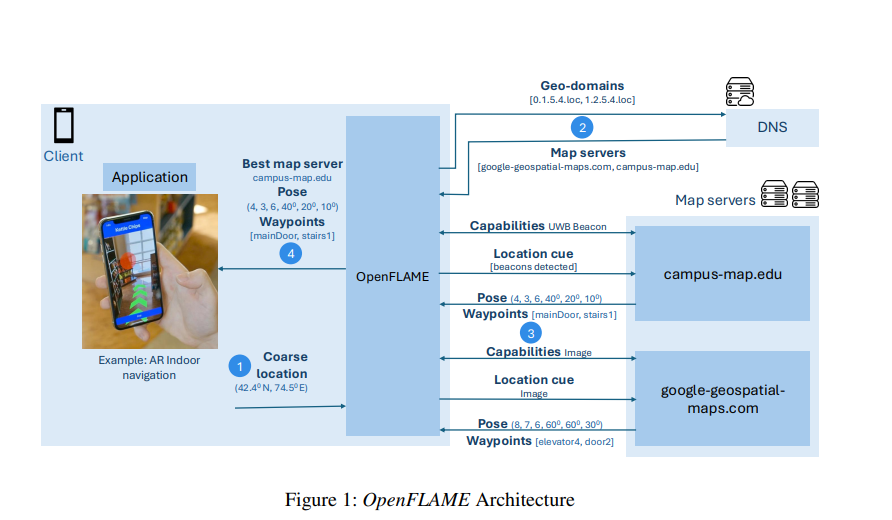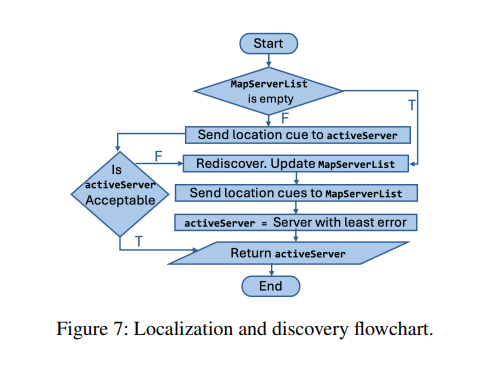Maps are widely used today and are useful in numerous location-based applications, including navigation, ride-sharing, fitness tracking, gaming, robotics, and augmented reality. As indoor location technologies advance, the need arises for a federated and scalable mapping service that can manage indoor and private spaces while overcoming privacy, scalability, and compatibility issues. There is a growing demand for a federated and scalable location management system that can be extended to private spaces. As the use of location-based applications expands and indoor location technologies advance, traditional centralized mapping infrastructures face challenges in terms of scale and privacy.
Current mapping services like Google Maps and Apple Maps are controlled by a few large corporations and cover primarily outdoor areas, leaving a gap in indoor location availability and privacy. They depend on previously collected data, which makes their extension to private spaces difficult and limited. These systems struggle with privacy issues and do not integrate easily with rapid advances in location techniques. A team of CMU researchers has proposed OpenFLAME (Open Federated Localization and Mapping Engine)), a federated and decentralized location service. OpenFLAME links servers that handle localization for specific regions, opening doors for more applications. It uses the Domain Name System (DNS), which computers use to identify each other on the network. Translates human-readable and understandable domain names into IP addresses.

open flame connects devices to localized map servers and works with the domain name system to discover appropriate regional servers, ensuring scalability. Each map server generates its local coordinate system, using a “waypoint” structure to help align overlapping maps while preserving privacy. A trace-based study by the same researchers showed that federated localization between remote servers is feasible with acceptable query latencies.
The OpenFLAME architecture consists of many steps: First, the device calculates the location using sources such as GPS, WiFi and Bluetooth, which is then converted into geographic domain names representing square regions. These geographic domains are used to access DNS lookups and find servers that offer mapping services for the area. The device sends all collected information to these map servers, which precisely determine the location and orientation of the device. The device then filters out all incorrect results and finds a suitable map server for your location. The pose and landmarks from the best map server are sent to the application. It periodically repeats the query to maintain precise location and switches map servers only when necessary.

In conclusion, OpenFLAME solves the privacy, scalability and interoperability challenges in locating indoor and private spaces by using DNS for service discovery and map abstractions. The current largely centralized approach to large-scale localization and mapping hinders the development of new location-based applications, and there is a great need for a service like OpenFLAME!
look at the Paper. All credit for this research goes to the researchers of this project. Also, don't forget to follow us on <a target="_blank" href="https://twitter.com/Marktechpost”>twitter and join our Telegram channel and LinkedIn Grabove. If you like our work, you will love our information sheet.. Don't forget to join our SubReddit over 55,000ml.
(Next LinkedIn Live Event) 'One Platform, Multimodal Possibilities,' where Encord CEO Eric Landau and Head of Product Engineering Justin Sharps will talk about how they are reinventing the data development process to help teams quickly build data models. Innovative multimodal ai.
Nazmi Syed is a consulting intern at MarktechPost and is pursuing a bachelor of science degree at the Indian Institute of technology (IIT) Kharagpur. He has a deep passion for data science and is actively exploring the broad applications of artificial intelligence in various industries. Fascinated by technological advancements, Nazmi is committed to understanding and implementing cutting-edge innovations in real-world contexts.
<script async src="//platform.twitter.com/widgets.js” charset=”utf-8″>
 NEWSLETTER
NEWSLETTER





